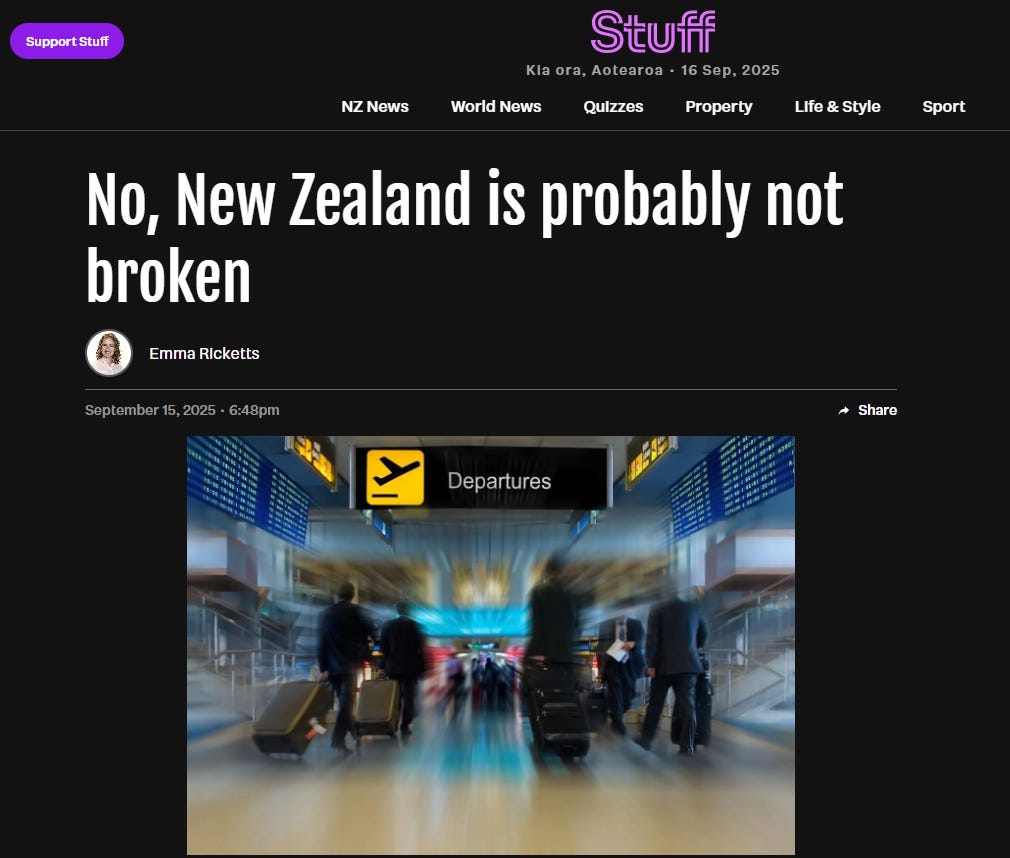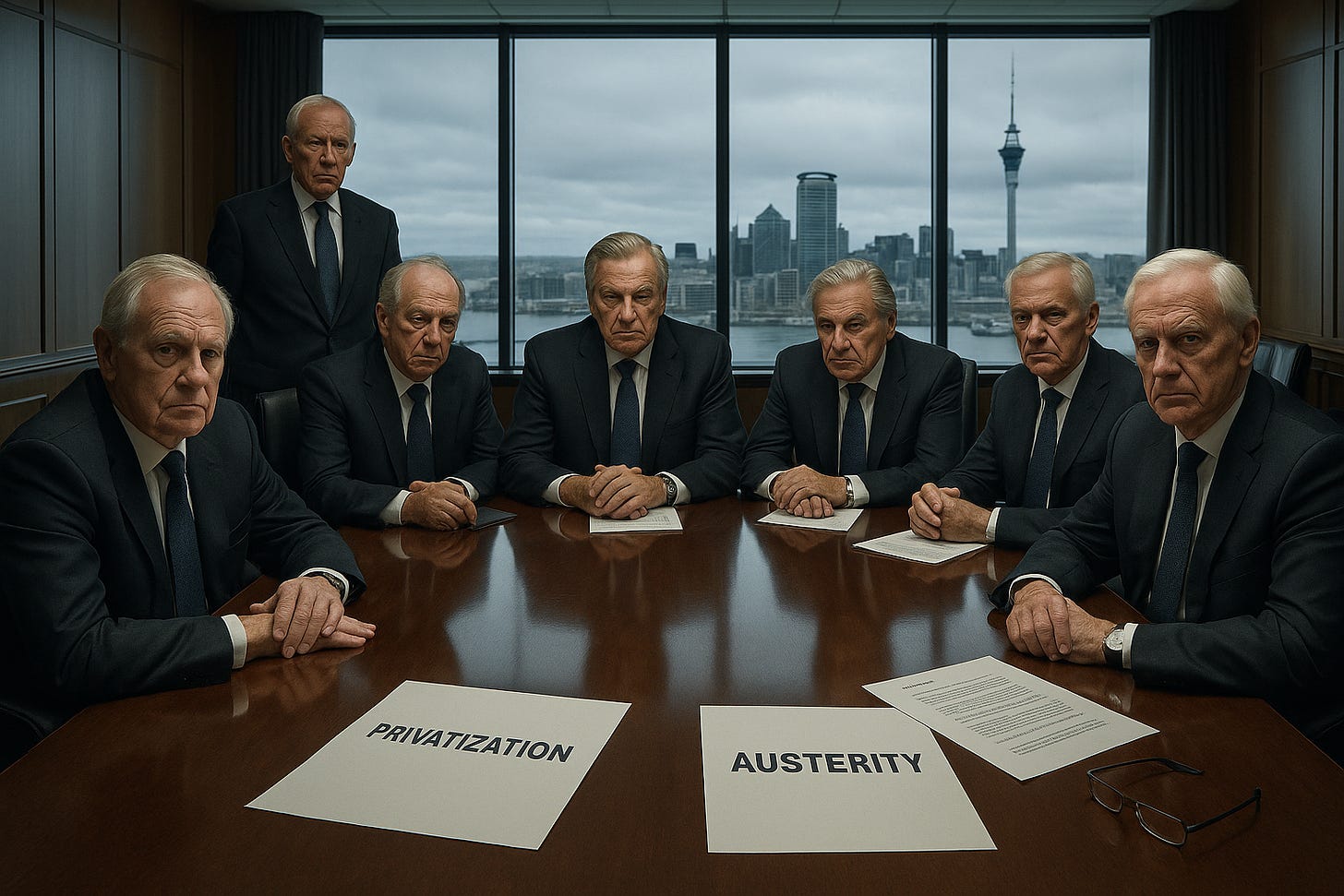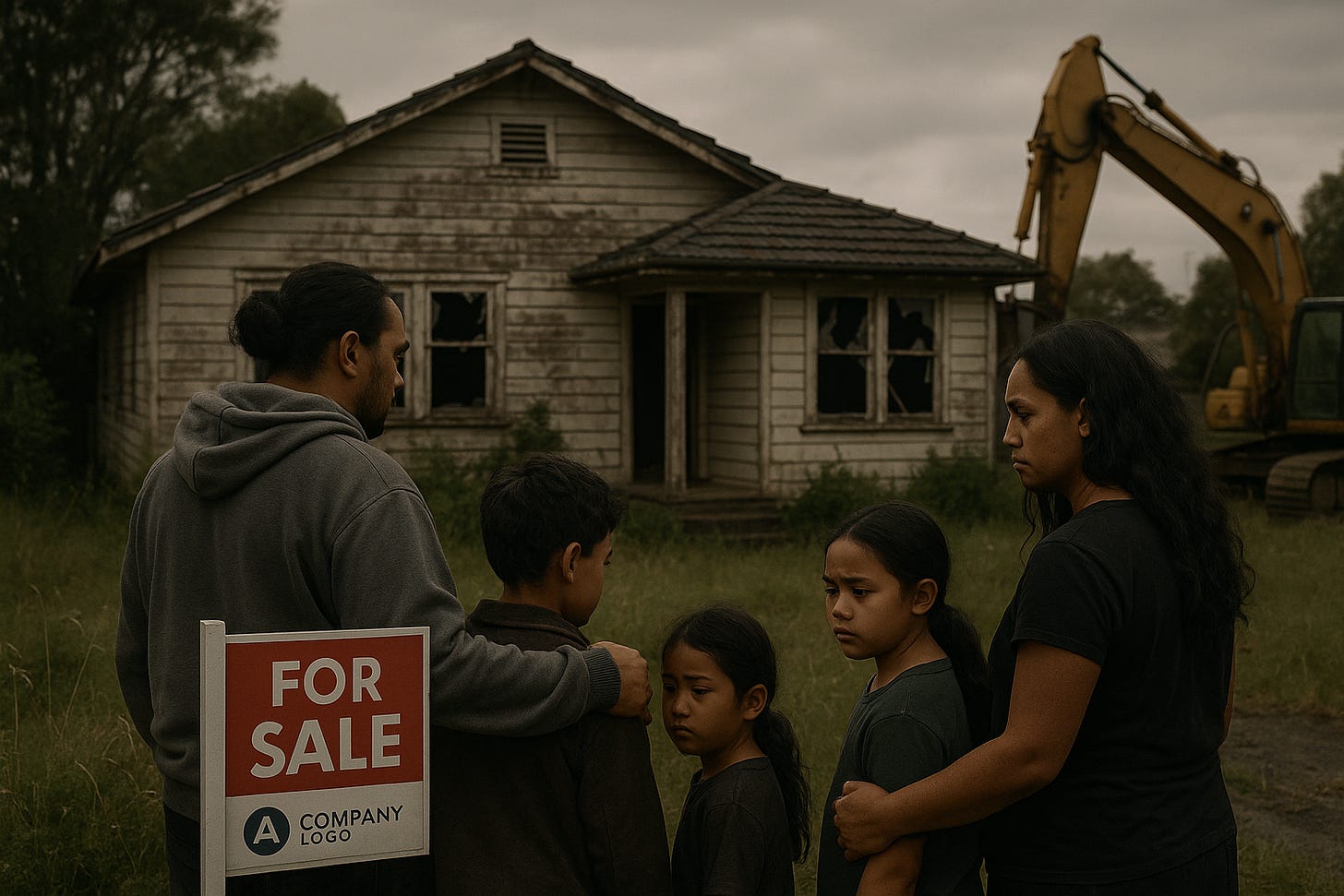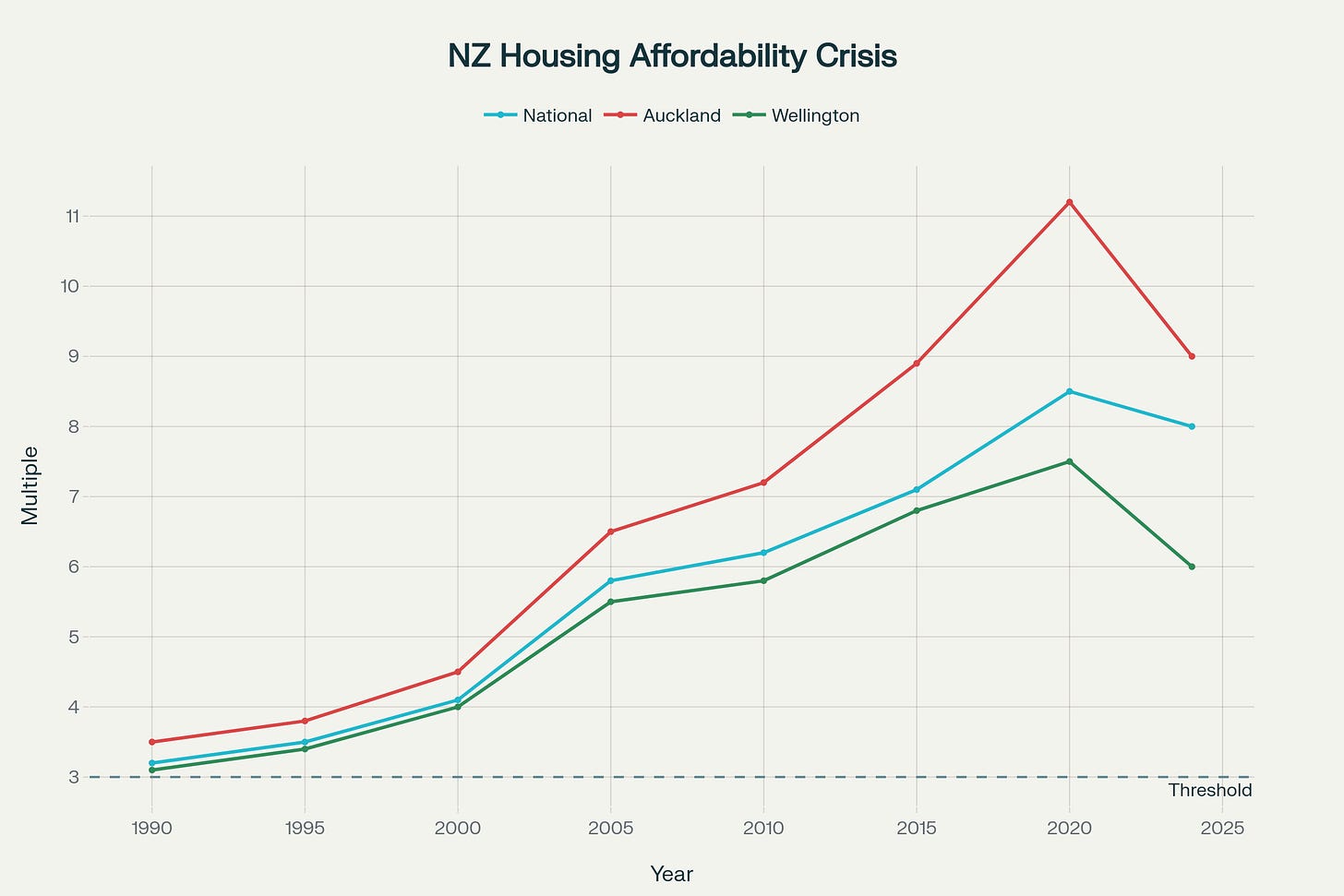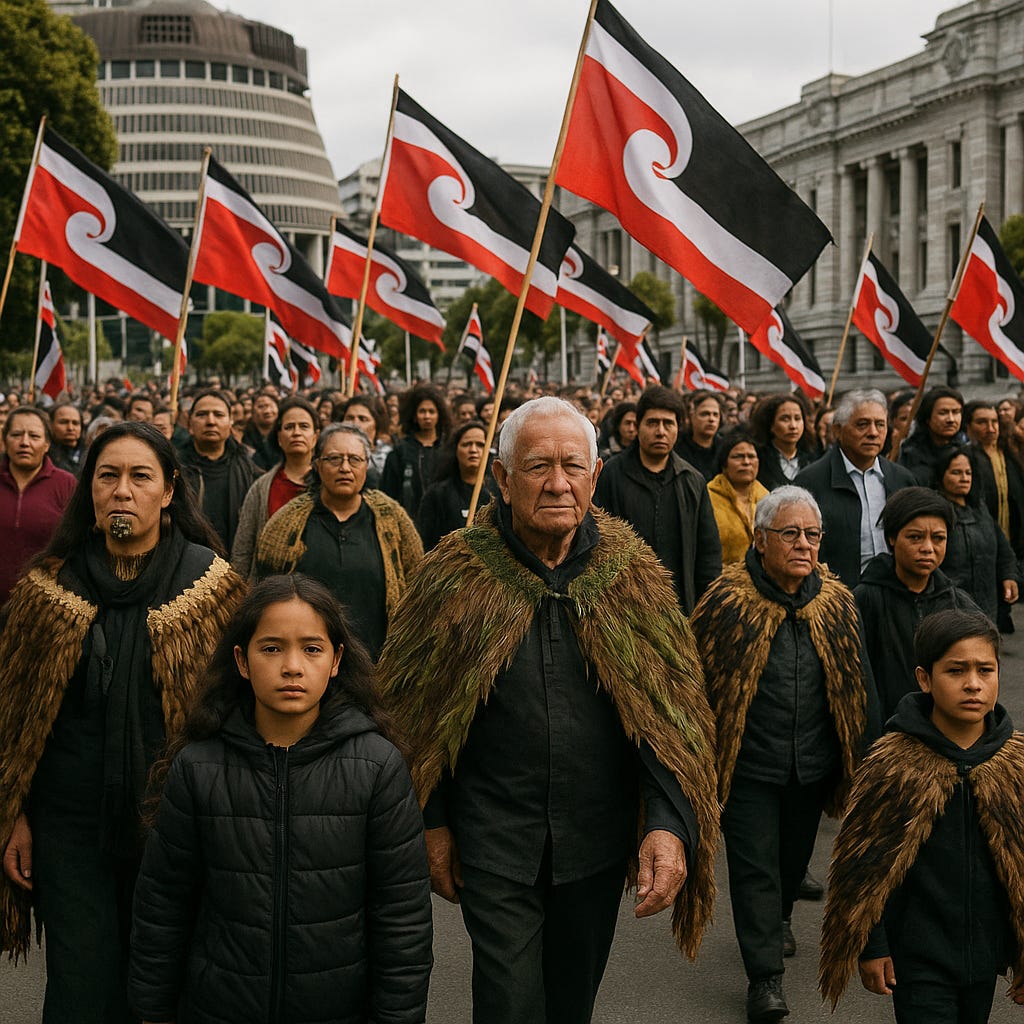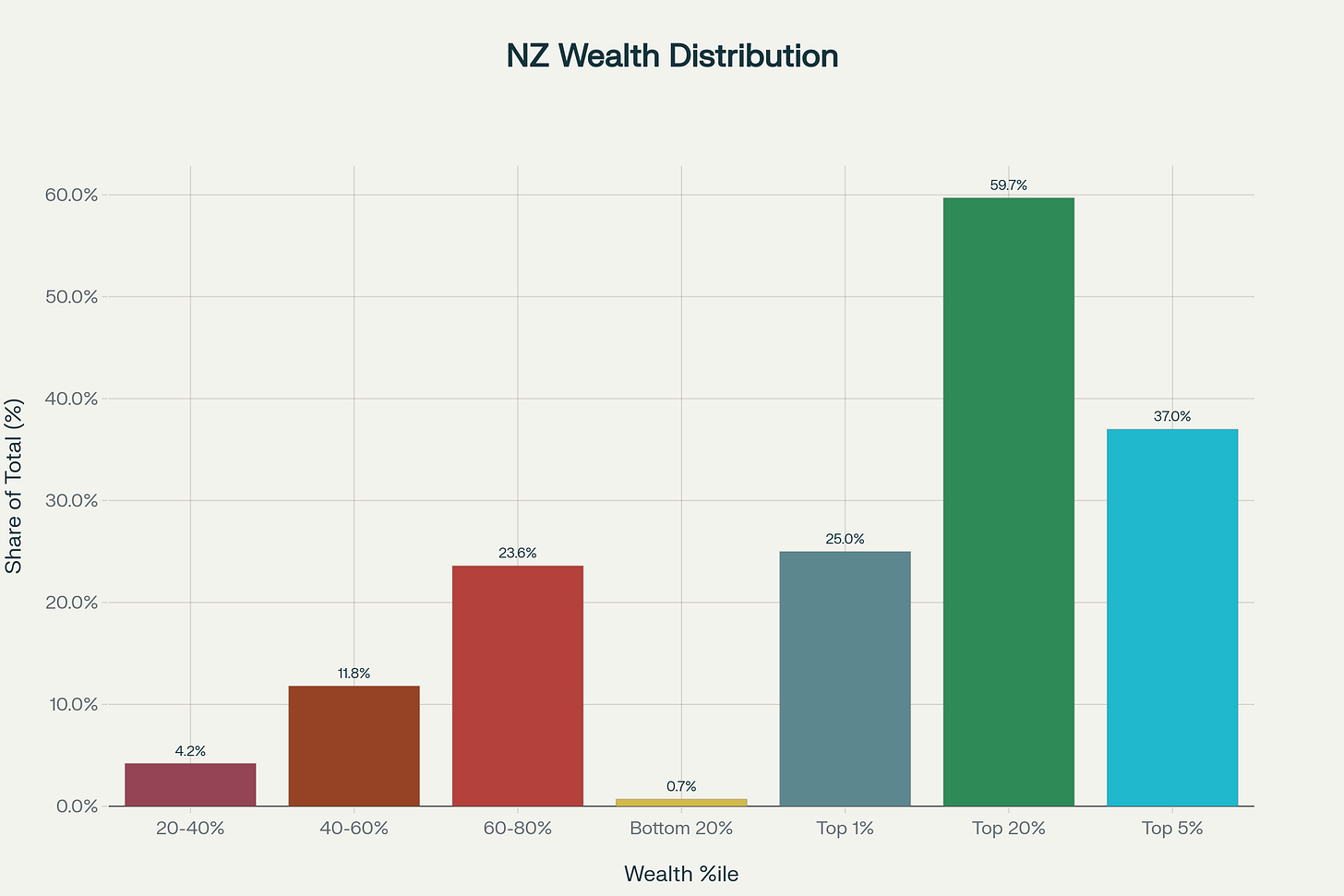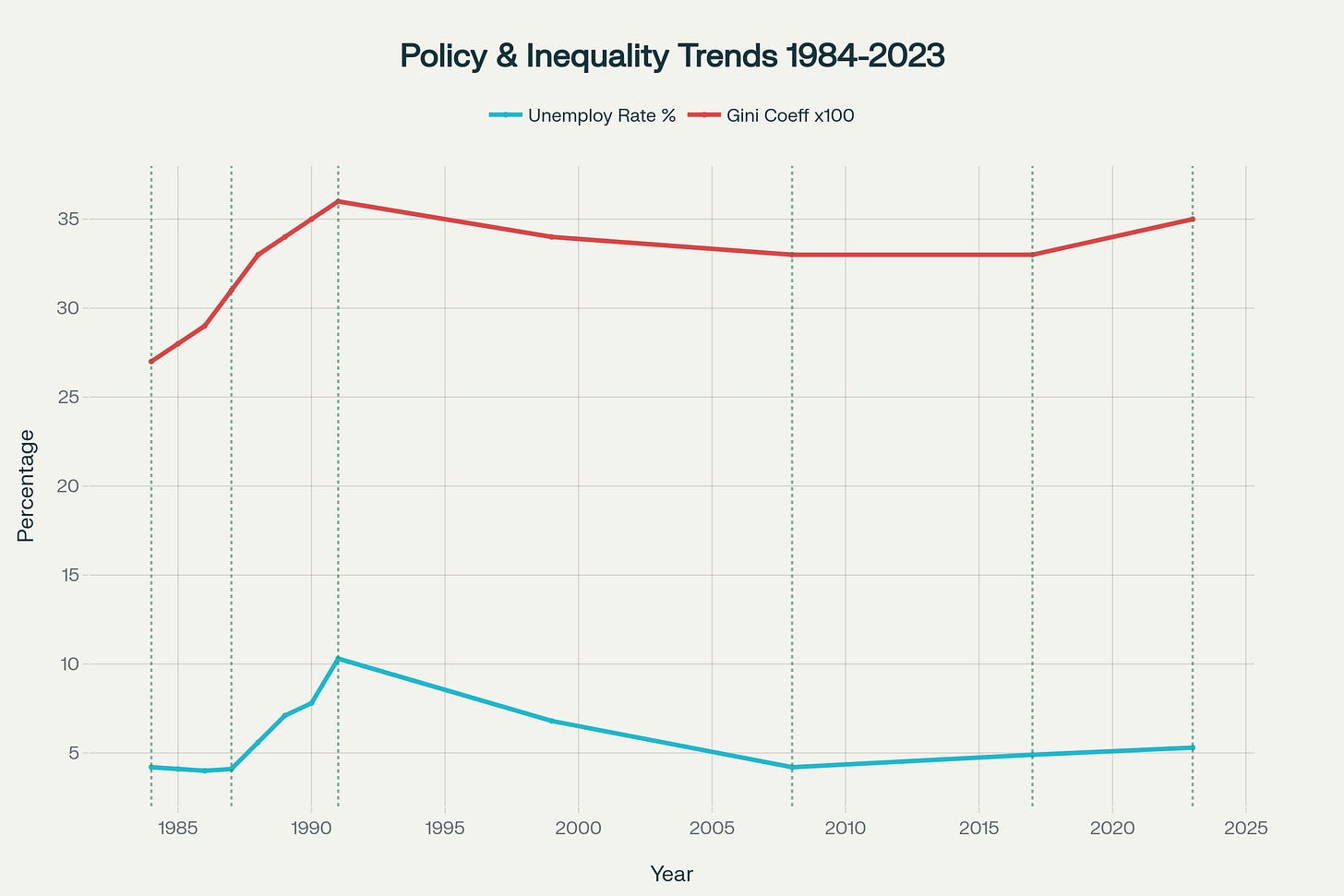“The "Broken Country" Myth: How Neoliberal Media Manufactures Crisis to Serve Elite Interests” - 16 September 2025
Deconstructing the false narrative that New Zealand is fundamentally broken while ignoring whose bloody hands created the carnage
Kia ora koutou katoa. Greetings to you all.
The parasitic narrative that "New Zealand is broken" has become the latest weapon in the arsenal of neoliberal propagandists and their media lapdogs, from opinion pieces crafted in corporate boardrooms to economic commentary that would make Roger Douglas himself blush with pride. This insidious discourse, while masquerading as legitimate concern about housing, cost of living, and economic challenges, serves as nothing more than a smokescreen to obscure the real architects of misery while advancing the same market fundamentalist solutions that created the disaster in the first place. When we examine these poisonous claims through a te ao Māori lens, grounded in the values of whakatōhea (collective responsibility) and manaakitanga (care for community), we expose how this "broken country" rhetoric functions as manufactured crisis designed to justify further asset stripping, public service vandalism, and policies that enrich the already bloated wealthy while grinding working whānau into poverty.
Elite corporate boardroom planning neoliberal policies
The emergence of this narrative coincides with the most obscene levels of wealth inequality in New Zealand's history, housing unaffordability that would make feudal lords envious, and the systematic hollowing out of public services - all direct results of four decades of neoliberal economic terrorism. Rather than acknowledging these structural causes, mainstream commentary prostitutes itself to present New Zealand's challenges as inevitable or the result of government "interference" in their sacred markets, setting up more privatization and deregulation as the only viable path forward.
Background
The concept of New Zealand as a "broken country" requires examination within its historical context of colonization and subsequent neoliberal transformation orchestrated by Roger Douglas and his gang of economic vandals. Since 1984, successive governments have systematically dismantled the social democratic foundations that once made New Zealand one of the world's most equal societies. This transformation, mockingly called "Rogernomics" after the architect of destruction Finance Minister Roger Douglas, involved massive privatization of public assets worth billions, deregulation of financial markets that opened the floodgates to speculation, and the demolition of worker protections that had taken generations to build.
For Māori, this period represented a vicious double blow - not only were the economic foundations of tino rangatiratanga systematically undermined, but the very concept of collective ownership and responsibility that underpins te ao Māori was attacked with the ferocity of a colonial army. The privatization of state assets often involved the sale of resources that had been violently confiscated from iwi in the first place, representing yet another layer of colonial dispossession wrapped in the language of "efficiency" and "modernization."
The term "broken" itself carries particular malice when wielded by those who benefit from the current system of exploitation. It suggests something that was once whole has been damaged, rather than recognizing that for many New Zealanders - particularly Māori, Pasifika, and working-class communities - the system was never designed to serve their interests but to extract wealth from their labor and transfer it to the pockets of the elite.
The "New Zealand is broken" narrative typically focuses on several key areas: housing unaffordability that has reached obscene levels, young people emigrating to Australia in search of basic dignity, economic stagnation deliberately engineered to suppress wages, and perceived government dysfunction manufactured by media outlets that serve corporate interests rather than public good. These are indeed serious issues affecting whānau across Aotearoa, but their framing and the solutions proposed reveal the underlying ideological cancer.
Commentary from figures like Brian Gaynor, who smugly argues that "New Zealand is not a 'broken country,'" often dismisses legitimate concerns about people sleeping in cars and families choosing between rent and food while defending the economic status quo that created these horrors. This defensive posture serves to protect existing power structures while minimizing the lived experiences of those struggling with housing costs, stagnant wages, and reduced public services - the very people whose suffering generates profits for landlords, employers, and financial speculators.
The narrative gains particular traction during economic downturns, when fear and uncertainty make populations more receptive to dramatic claims about national decline. Recent discussions about economic "purgatory" and young people leaving for Australia tap into genuine anxieties while directing anger away from the systemic causes and toward convenient scapegoats like immigrants, beneficiaries, or Māori exercising their Treaty rights.
Working families displaced by housing privatization
For Māori communities, this discourse is particularly venomous because it ignores how colonization and neoliberalism have systematically undermined traditional economic models based on reciprocity, sustainability, and collective wellbeing. The "broken" narrative implies we need to fix something that was working, rather than recognizing that we need to dismantle systems designed to extract wealth and concentrate power in the hands of a parasitic elite.
Manufacturing Crisis for Neoliberal Solutions
The "broken country" narrative functions as what Naomi Klein identified as "shock doctrine" - using real or manufactured crises to justify policies that would otherwise provoke revolution. When media outlets amplify messages about economic decline and national failure, they create the psychological conditions necessary for populations to accept harsh medicine in the form of further deregulation, privatization, and austerity measures that benefit only the wealthy.
New Zealand Housing Affordability Crisis: House Price-to-Income Multiples 1990-2024
This manufactured crisis serves multiple functions for the neoliberal death cult. First, it deflects attention from the policy choices made by specific individuals with names and addresses who created current problems. Rather than examining how decades of tax cuts for the wealthy, privatization of public assets, and deregulation of financial markets have concentrated wealth and power, the focus shifts to abstract concepts of national failure or government incompetence that conveniently absolve the real perpetrators.
Second, it creates artificial urgency around market-based solutions. If the country is truly "broken," then dramatic action is needed - usually involving giving more power and resources to the same private sector parasites whose greed created the crisis. This was evident in the post-2008 financial crisis rhetoric that justified bank bailouts while imposing austerity on working families who had done nothing wrong except trust a system designed to exploit them.
The Role of Class Interest in Economic Commentary
Much economic commentary in New Zealand emanates from individuals whose class position insulates them completely from the impacts of the policies they advocate. When wealthy commentators dismiss concerns about housing unaffordability or stagnant wages as evidence that "New Zealand is not broken," they reveal how their material interests shape their perspective with surgical precision.
From a te ao Māori perspective, this individualistic analysis violates the principle of whakatōhea - our collective responsibility for each other's wellbeing. Traditional Māori economic systems were based on ensuring everyone had access to resources needed for dignity and survival. The current system, by contrast, treats housing, healthcare, and education as commodities to be bought and sold rather than rights to be guaranteed collectively.
The emigration of young New Zealanders to Australia is often presented as evidence of personal choice rather than structural failure orchestrated by policies designed to suppress wages and inflate asset prices. However, when examined through the lens of whakapapa and whakatōhea, this movement represents a breaking of connections to whenua, iwi, and community that has profound cultural and spiritual costs beyond individual economic calculation.
Media Complicity in Neoliberal Narratives
The corporate media's role in amplifying "broken country" narratives while systematically minimizing structural analysis reveals how media ownership shapes public discourse with the precision of a scalpel. Stuff and other major outlets operate within a commercial framework that depends on advertising revenue from businesses that benefit directly from neoliberal policies. This creates inherent conflicts of interest that make genuine criticism of capitalism about as likely as finding integrity in a National Party conference.
This structural bias creates coverage that focuses on symptoms rather than causes, individuals rather than systems, and market solutions rather than democratic alternatives. The framing of economic problems as "natural" phenomena rather than deliberate policy choices serves to depoliticize issues that are fundamentally political, making resistance appear futile and alternatives unthinkable.
When housing unaffordability is presented as the result of "supply and demand" rather than decades of treating housing as a financial investment rather than a human right, it obscures the role of deliberate policy choices in creating the crisis while deflecting attention from the landlords, developers, and financiers who profit from human misery.
Exposing the Far-Right Connection: The Pipeline from "Broken Country" to White Supremacy
The "broken country" narrative serves as a gateway drug to far-right political solutions, creating the conditions for authoritarian movements to flourish. When mainstream problems like housing costs and wage stagnation are framed as evidence of national decline, it creates psychological space for fascist voices promising to restore order and national greatness through violence against the vulnerable.
This dynamic poses particular danger for Māori communities, as far-right movements consistently target Indigenous rights and Treaty obligations as obstacles to their vision of racial purity. The recent activities of extremist groups demonstrate how economic anxiety can be channeled into racist and anti-democratic directions by skilled demagogues.
The current government's assault on Māori rights - including attacks on co-governance, te reo Māori, and Treaty principles - demonstrates the direct connection between neoliberal economics and white supremacist politics. When Finance Minister Nicola Willis cuts public services while refusing to tax wealth, and when Deputy Prime Minister Winston Peters compares co-governance to apartheid, they are implementing the same agenda that benefits wealthy elites while scapegoating Māori for the resulting social problems.
The international connections are equally revealing. Brian Tamaki's extremist rallies alongside his claims about "the spread of non-Christian religions being out of control" expose the global network of white supremacist movements that coordinate attacks on Indigenous peoples worldwide. When Action Zealandia members infiltrate political parties and coordinate with international neo-Nazi networks, they are implementing strategies developed by fascist movements across the settler colonial world.
Māori leading resistance against neoliberal attacks on Treaty rights
Hidden Connections: The Douglas-Luxon-Peters Axis of Destruction
The connections between key figures in New Zealand's neoliberal transformation reveal a deliberate, coordinated assault on democratic governance and Indigenous rights spanning four decades. Roger Douglas, the architect of the 1980s reforms, didn't work alone - he operated within networks of business leaders, international advisors, and political operatives who continue to shape policy today.
Christopher Luxon's background in corporate leadership connects him directly to the business interests that profited from Douglas's reforms. His rapid dismantling of Māori policies upon taking office reveals coordination with groups like the Taxpayers' Union and Hobson's Pledge that have spent years preparing anti-Māori policy frameworks.
Winston Peters' long history of anti-Māori rhetoric serves the same function today as it did in the 1990s - providing populist cover for policies that transfer wealth from working people to corporate elites. His attacks on co-governance and te reo Māori create political space for more extreme measures while maintaining plausible deniability about racist intent.
The timing of policy announcements reveals careful coordination. The reversal of Māori health authority policies occurred simultaneously with cuts to public services and tax reductions for property investors, demonstrating that attacks on Indigenous rights serve as political cover for broader neoliberal assault on public goods.
Implications
The "broken country" narrative has profound implications for how New Zealand responds to genuine challenges manufactured by four decades of neoliberal vandalism. By framing problems as evidence of national failure rather than policy choices made by identifiable individuals with material interests, it undermines democratic engagement and collective problem-solving while protecting the real perpetrators from accountability.
Extreme Wealth Inequality in New Zealand: Share of Total Wealth by Income Percentile
For Māori communities, this discourse threatens to further marginalize Indigenous perspectives and solutions at precisely the moment when traditional Māori economic models offer genuine alternatives to competitive individualism. Values like manaakitanga, whakatōhea, and kaitiakitanga provide frameworks for organizing economic activity based on sustainability, reciprocity, and collective wellbeing - but these alternatives cannot gain traction within a discourse framework that presents market solutions as natural and inevitable.
The psychological impact on young people deserves particular attention. When an entire generation is told their country is broken and their only option is emigration, it undermines the collective commitment needed to build alternative systems while serving neoliberal interests by reducing the population available to organize for structural change and maintaining pressure on wages for those who remain.
The narrative also serves to justify increasing authoritarianism by suggesting that normal democratic processes are inadequate for addressing national crisis. This creates political space for policies that concentrate power in corporate hands while reducing democratic oversight and public participation - exactly the conditions fascist movements need to flourish.
The Māori Green Lantern Fighting Misinformation And Disinformation From The Far Right
The "New Zealand is broken" narrative represents sophisticated ideological warfare designed to serve elite interests while undermining collective responses to genuine challenges created by neoliberal policies. By presenting structural problems created by identifiable policy choices as evidence of national failure, this discourse deflects attention from systemic causes while promoting the same market-based solutions that created the problems in the first place.
From a te ao Māori perspective, grounded in values of whakatōhea and manaakitanga, the real crisis is not that New Zealand is broken but that we have allowed systems based on extraction and exploitation to override our traditional commitments to collective wellbeing and environmental sustainability. The path forward requires rejecting manufactured crisis narratives in favor of honest assessment of how specific policy choices made by identifiable individuals have created current problems.
The Neoliberal Transformation: Unemployment and Inequality in New Zealand 1984-2023
This means acknowledging that housing unaffordability, wage stagnation, and public service deficits are not natural phenomena but predictable results of treating human needs as market commodities. It means recognizing that Roger Douglas, his corporate sponsors, and their contemporary successors bear direct responsibility for the suffering they have inflicted on working families while enriching themselves and their class allies.
Real solutions require rebuilding systems based on reciprocity, sustainability, and collective responsibility - values that have sustained Māori communities for centuries and offer genuine alternatives to the competitive individualism that drives current crises. This means confronting not just policies but the power structures and class interests they serve.
Rather than accepting manufactured narratives about national failure, we must recognize that our systems can be transformed through democratic engagement, collective action, and unwavering commitment to ensuring everyone has access to resources needed for dignity and wellbeing. The alternative is accepting permanent subjugation to a parasitic elite whose wealth depends on our poverty.
The choice is clear: continue accepting the "broken country" lie that serves those who broke it, or unite behind Indigenous-led alternatives that prioritize people and planet over profit and exploitation.
Readers who find value in exposing these manufactured narratives and building genuine alternatives based on Māori values are invited to consider a koha to support this work: HTDM: 03-1546-0415173-000. The MGL understands these tough economic times for whānau so please only contribute if you have capacity and wish to do so.
Mauri ora, mauri tangata, mauri whenua.
Ivor Jones
The Māori Green Lantern



